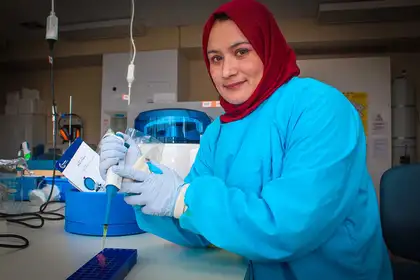
Health Sciences and Riddet Institute doctoral student Saima Rizwan.
Health Sciences and Riddet Institute doctoral student Saima Rizwan hopes to one day create medication that will treat the incurable joint disease osteoarthritis.
Osteoarthritis currently affects one in six New Zealanders over the age of forty and is the most common degenerative joint disorder in the world. It is a progressive disorder that can be managed through medication and therapy but unfortunately remains incurable.
“Green lipped mussels are considered to be one of the most effective treatments for osteoarthritis. It has gained global recognition for its ability to prevent joint inflammation,” Mrs Rizwan says. “Green lipped mussels are native to New Zealand and used to treat many inflammatory conditions including osteoarthritis.”
The extract from these mussels is known to prevent inflammation of the joints, however it is not known how it does this. Mrs Rizwan is working with these extracts to understand how the disease progresses.
“Not much is known about how osteoarthritis progresses as the biological markers in its progression have not yet been identified. What is known is that green lipped mussel extract can be used to effectively treat osteoarthritis and other inflammatory conditions. This knowledge is invaluable to my study as once I have managed to identify the biological markers in osteoarthritis I will then be able to test different cells with green lipped mussel extract to understand how it affects the human body.”
This work could help Mrs Rizwan in finding a prevention or cure for the incurable disease.
“I love what I do. It’s so exciting and the research is so interesting. I have always been interested in how the human body functions and learning how to improve health and cure diseases. Hopefully I can use my knowledge to develop a drug that can combat this disease.”
Originally from Northern Pakistan, Mrs Rizwan moved to New Zealand on a Riddet Institute scholarship with her young family in May 2017 after her friend recommended that she study in here. “I had the right support behind me and really believed I had to make the most of this opportunity.”
In Pakistan, she studied at the University of Hazara, where she completed a Bachelor of Science in biochemistry with honours. She became a lecturer at the University of Hazara, where she spent four years teaching. Education is of great importance to Mrs Rizwan and so she decided to complete her PhD in Health Science in New Zealand.
She says the environment at Massey has helped her a lot. “The encouragement and support I receive from my supervisors is one reason that motivates me to continue with my studies. They really understand what I am trying to achieve and for that I am thankful.”
Her research is funded by the High-Value Nutrition programme, one of New Zealand’s National Science Challenge platforms. The “Musseling Up” project is a multi-centre-collaboration, and this is reflected in her supervisory panel of five scientists from Massey University, the Cawthron Institute, and Sanford Ltd. Mrs Rizwan was also given the opportunity to present at the Riddet Institute Annual conference in 2017 and 2018, where the Riddet Institute had gathered a large number of nationally and internationally renowned food and nutrition scientists to share their knowledge and expertise.
After completing her PhD, she hopes to move back to Pakistan and begin her own health clinic. She wants to use her knowledge and expertise to change lives. “It’s exciting to think that one day I could change the lives of so many affected by this disease.”